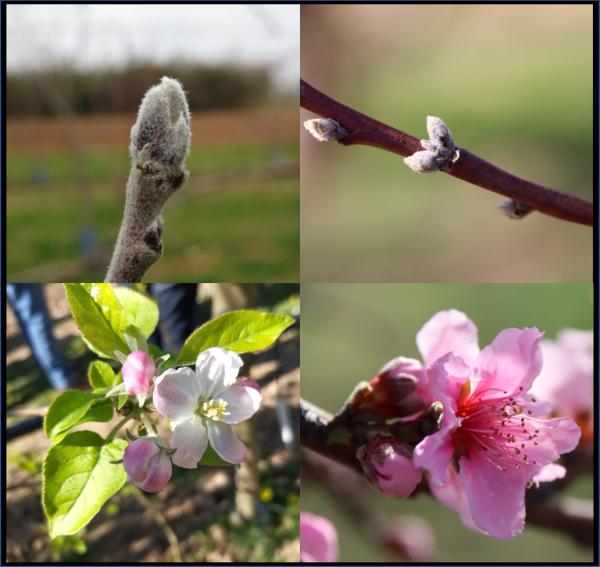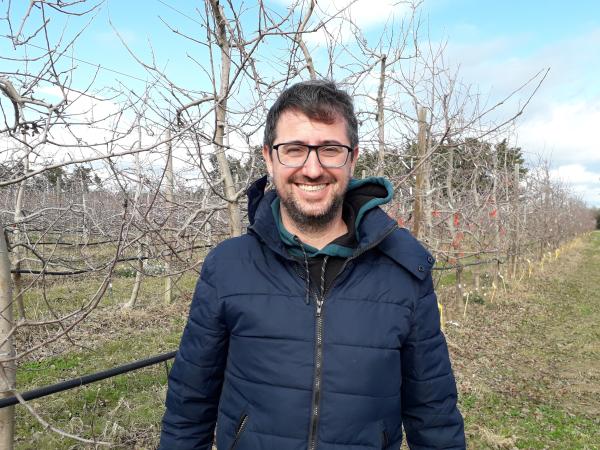Predicting and tuning seasonal responses of apple and peach to improve orchard yield and climate change resilience

Source: Fernando Andres Lalaguna
The life-cycles of fruit trees are closely synchronized with seasonal cycles. These seasonal patterns of growth and flowering are crucial for successful fruit production and yield. Responses to temperature and day length control these seasonal patterns. During autumn and early winter, buds and apices of fruit trees become dormant in response to low temperatures and short days. This dormancy is eventually overcome by longer exposure to cold, allowing growth to resume in spring in response to longer days and warmer temperatures. Environmental cues such as winter and spring temperatures that control these cycles are altered with climate change threatening yield. However, our ability to breed new tree cultivars is hampered by our lack of knowledge of the molecular and genetic mechanisms underlying these economically important environmental responses, particularly how trees detect and respond to temperature changes. The FruitFlow project brings together an international consortium of five academic and three commercial partners to address these issues for two important perennial crops: apple and peach. We propose to develop novel technologies for predicting and promoting flower and fruit production. First, we will acquire data on the seasonal behavior of diverse panels of apple and peach varieties. Climatic conditions at the growing sites will be recorded daily while regular aerial images will be acquired with Unmanned Aerial Vehicles together with Near InfraRed Spectroscopy (NIRS) measures on leaves and buds. High-throughput analytical methods will be developed using computational modeling approaches to predict the behavior of cultivars in different environments from the aerial images, NIRS data and chemical analyses. Second, we will identify genetic associations between the behavior of apple and peach cultivars and polymorphisms in their genomes. Existing panels of diverse cultivars of each species will be used. Genome Wide Association Studies (GWAS) will be performed to identify polymorphisms associated with loci and candidate genes regulating bud dormancy, budbreak and seasonal control of related leaf developmental processes. Third, the chemical content of apple and peach buds will be analyzed between December and February to identify small molecules whose appearance correlates with different stages of the dormancy cycle. Proteins that interact with these molecules will then be identified by co-precipitation and computational methods. Fourth, the functions of proteins identified as interacting with small molecules or from GWAS will then be tested by reverse genetics or transgenic approaches. Due to the difficulty of generating transgenic apple and peach plants and their long generation time, these experiments will be performed using perennial plant models such as poplar trees and perennial herbaceous models such as Arabis alpina. For both of these species rapid transformation methods have been generated allowing to test a wide range of genes. The function of apple and peach genes will be tested in these model species by introducing candidate genes directly, by overexpressing them and by inactivating model-species orthologues of the apple and peach genes. The plants generated will be tested for flowering behavior in response to seasonal cues and for the dormancy and flowering behavior of axillary branches. Fifth, chemicals identified as accumulating at different stages of the dormancy process will be tested for their capacity to stimulate bud break or flowering of apple and peach by direct application. Thus, FruitFlow will contribute to solving an important current problem in European Agriculture by bringing together an international, multidisciplinary consortium to produce fundamental knowledge on bud dormancy and budbreak in fruit trees and to test its significance under field conditions.

Source: Fernando Andres Lalaguna
Dr. Fernando Andres Lalaguna
UMR AGAP, FRANCE
Email: fernando.andres-lalaguna@inrae.fr
Dr. Mariano Perales
Centre for Plant Biotechnology and Genomics UPM – INIA, SPAIN
Prof. George Coupland
Max Planck Institute for Plant Breeding Research, GERMANY
Dr. Gabino Rios
Instituto Valenciano de Investigaciones Agrarias (IVIA), SPAIN
Dr. Jesús Garcia Brunton
Instituto Murciano de Investigacion y Desarrollo Agrario (IMIDA), SPAIN
Mr. Julio Diaz-Hernández
UTW, SPAIN
Mrs. Julie Ruch
Sudexpe, FRANCE
Mrs. Teresa Yuste
IDAI NATURE S.L., SPAIN
Project webpage: https://umr-agap.cirad.fr/en
Twitter: https://twitter.com/FruitflowP